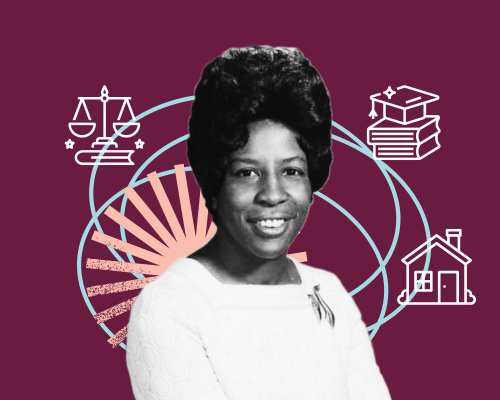
Women’s History Month is a time to reflect on contributions of women to history that should be more widely known and recognized. The history of the ACLU has been entwined with women’s rights since its founding, and its work on sex-based discrimination, bodily autonomy, gender-affirming care and countless other issues continue this legacy.
This month, it is especially important to highlight women who understood the need to further women’s rights here in Washington state.
Peggy Joan Maxie, the first Black woman elected to the Washington State House of Representatives, was best known for her work passing landmark legislation protecting tenants’ rights and preserving access to public education.
Maxie was born in Amarillo, Texas in 1936, but grew up in the Central District after her family moved when her mother got a job at Boeing. She graduated in 1970 with a degree in psychology from Seattle University and later got a master’s degree in social work from the University of Washington in 1972.
Maxie’s entry into politics happened somewhat by chance. Her brother, Fred Maxie, was going to run for the state legislature but later changed his mind, choosing to enter law school instead. His campaign signs with the name “Maxie” on them were already printed and her family encouraged her to run.
Maxie won the election in 1970 to represent the 37th Legislative District, which covers the Central District neighborhood through Southeast Seattle, becoming the first Black woman elected to the state House of Representatives.
She served six terms in the House, championing issues of civil rights, welfare and affordable public education. Maxie is best known for her work on tenant protections and was the primary sponsor of the House version of the Landlord-Tenant Act of 1973.
The Landlord-Tenant Act of 1973 dramatically overhauled state laws governing the relationship between landlords and tenants. As previously written, the outdated law from the 1800s primarily focused on leasing farmland and desperately needed updating.
The new law established landlord responsibilities such as basic maintenance and required notification before going into a tenant’s unit — protections we take for granted today but have only been around for the last 50 years. It also established that if landlords didn’t maintain their properties, tenants could put their rent money towards repairs or withhold part of their rent if they were without basic resources like heat or water.
High rents and eviction are among the contributing factors that lead to homelessness. ACLU-WA is actively continuing Maxie’s work on this issue by combatting the criminalization of people who are unhoused and working with community to change the circumstances that lead to a lack of housing in the first place.
Maxie was also a champion for education, serving as chair of the House Higher Education Committee where she rejected efforts to raise tuition at public universities. During her tenure as chair, the current governor proposed an increase in tuition for public universities and colleges. Maxie introduced a resolution to establish a citizen’s task force to review the potential increase, citing that public input was essential given that this issue impacted everyone from veterans to working mothers to low-income individuals.
Along with another legislator, Maxie also cosponsored the Displaced Homemakers Act, which help women who lost income because of the death and disability of a spouse or following divorce. Women who found themselves displaced often found themselves without income and ineligible for welfare assistance, facing discrimination due to age and lack of work experience. The act allowed these women to have training opportunities and services through local community and technical colleges.
Her colleagues described Maxie as a lawmaker with integrity, patience and humility, and as someone who believed in analysis and preparation before acting. She cared deeply for the needs of her constituents and remained actively involved in her community. Maxie also later went on to found Women in Unity, a nonprofit focusing on employment and advocacy for Black women.
Maxie’s legislative career ended when she was defeated in the primary by Gary Locke in 1982. After leaving the Legislature, she worked as a consultant and mental health therapist and marriage counselor while living in the Central District. On Feb. 18, 2024, Maxie died at the age of 87.
We honor the legacy of Maxie’s work and, working with community, hope to continue the effort to equity and justice for everyone in Washington, regardless of gender.
Sources and additional information
- Maxie, Peggy (b. 1936) - HistoryLink.org
- Peggy Maxie, first Black woman elected to WA state House, dies | The Seattle Times
- Seattle University Oral History Recordings - Archives West (orbiscascade.org)
- Peggy Joan Maxie (1936-2024) • (blackpast.org)
- Legislative Update: Bills of Mine Becoming Law, Remembering Peggy Maxie, FAFSA News & More – Chipalo Street (wa.gov)




